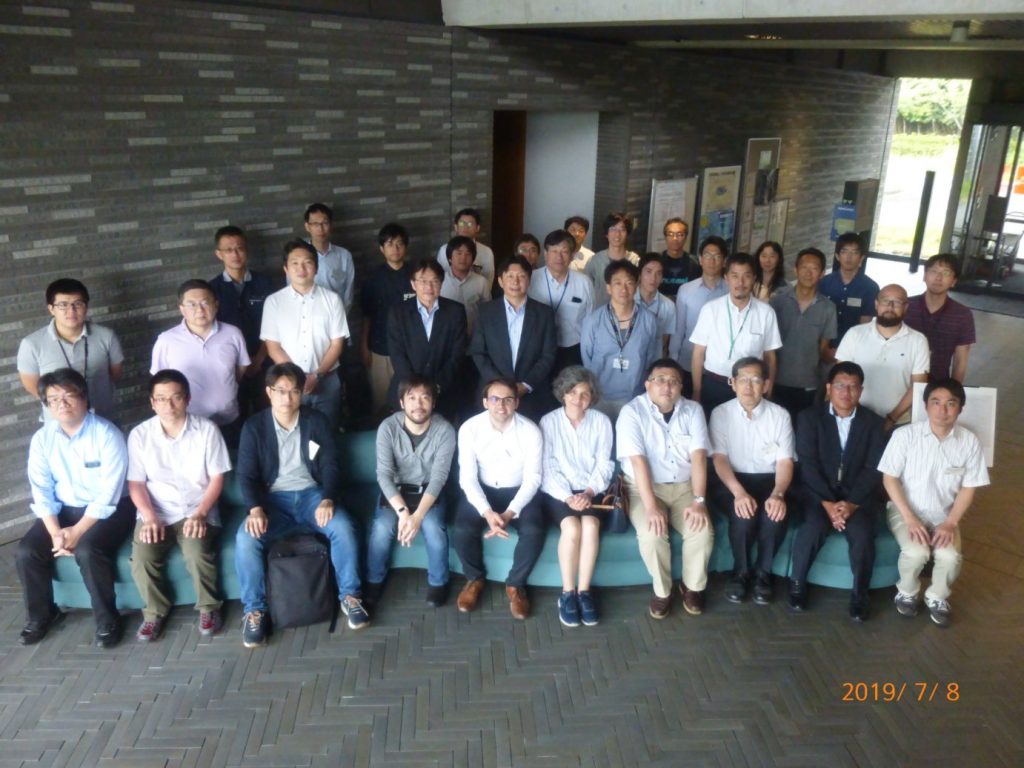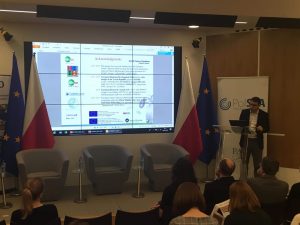- Participants of the Marie Curie project “ATLANTIC” (work packages 3 and 5) stayed one month at HiLASE in September. Assoc. prof. Usman Sapaev and Dr. Sergey Starinskiy both performed an invited HiLASE seminar and presented invited oral presentation at the conference ALT19 (Advanced Laser Technologies).
- The computational time offered by PRACE (HPC project DECI15th “BOLERO”) is now accessible. Certifications by FZU are sufficient to access the resources.
- T. Derrien presented an invited talk at the ALT19 conference on the long standing works on transient excitation of electrons in solids.
BOLERO HPC (PRACE) project: accepted.
The BOLERO PRACE project for high power computation (HPC) has been accepted. Therefore, we got 2.6 million core-hours on top of our resources for 2019-2020.
This will support the heavy computations we run using time-dependent density functional theory at HiLASE RP4 for making predictions in the field of laser processing, and for the ATLANTIC project.
Seminar at the Kansai Photon Institute (Japan)
It was an honor to be invited by prof. Yabana and Dr. Otobe to the Kansai Photon Institute in Japan for having an excellent workshop there and visiting Kyoto and Nara, the former capital cities of Japan.
Title of the seminar was “Predicting laser surface nanostructuringusing dispersion laws in the complex plane.”
Seminar at the Tokyo University, June 19th 2019
On June 19th, TJY Derrien was honored to present a seminar in the group of Prof. Ishikawa (University of Tokyo).
Title was: “Predictive modeling of materials excitation, melting and nanostructuring upon femtosecond laser irradiation: first-principle and phenomenological perspectives”.
Duration of the talk was 1h. Here is the link to the official announcement.
Questions from the inviting professors were accurate and numerous.
HPC: We have been allocated 3.5 million core-hours by Czech Republic
The project IT4I/MORILLE has been granted. It consists in providing a computational time of 3.5 M core-hours to implement the Marie Curie ATLANTIC project we obtained with HiLASE and with a number of partners. The PI is Dr T. J.-Y. Derrien, and the project includes the training of several people at HiLASE, plus the hosting of the incoming researchers of the ATLANTIC project.
Thanks to this project, HiLASE has now access to all the scales of machines that are necessary to prepare efficient HPC simulation codes.
- BIATRI-SRV to prepare codes for shared memory architectures (OpenMP).
- MetaCentrum to prepare codes for distributed memory architectures (MPI) and GPU simulation.
- IT4I to execute codes on distributed memory architectures and GPUs.
Atlantic-rise.eu is now open!
The Marie Curie project ATLANTIC has now its own website: http://www.atlantic-rise.eu/
QuantumLaP.eu has nicely provided the software frame for the project starting. The management, the project info and the mailing lists are from now transferred to the new official website.
Our new paper on surface polaritons inducing LIPSS in thin films has been published online
Our paper titled “LIPSS on thin metallic films: New insights from multiplicity of laser-excited electromagnetic modes and efficiency of metal oxidation” has been published in Applied Surface Science (IF 4.4).
The paper explains the period of Laser-Induced Periodic Surface Structures (LIPSS) on thin Cr film, with accounting for the influence of the substrate. It also provides a convincing model of HSFL formation where the role of metal oxidation is dominant.
Selected outcomes of ERC Starting grant application
Calendar of the ERC Starting Grant 2018
- October 17th 2018: ERC starting grant application “QLARINET” was submitted at the Max Planck Institute for Structure and Dynamics of Matter (Hamburg).
- March 15th 2019: first notification of the status of the project were received.
- April 17th 2019: evaluation reports were made available on the EU portal.
- July 26th 2019: statistics and list of awarded applicants was published on the ERC portal.
Selected panel’s outcome
- “The publication record of PI is very good, academic track includes also wide collaborations, research funding and continuous activity in working on challenging problems.”
- “The driving idea of this proposal is new and courageous, when compared to current methods.”
- “The objectives and the scientific approach are well detailed.”
Selected referees outcomes
- “Both risk and gain are high, yet challenge is admirable”
- “The approach is clearly compatible with research objectives and work packages, proceeding in rational order. Risk is high across entire work schedule.”
- “The scientific approach is brief but clear and well-structured”
- “This is a novel idea, taking a brave step forward compared to existing works”
- “The outlined scientific approach is described in a very detailed manner, and the PI is competent to what he is proposing.”
Short answers to specific points
- To what extent has the PI demonstrated the ability to conduct ground-breaking research? Very good | Very good | Very good
- To what extent does the PI provide evidence of creative independent thinking? Very good | Very good | Very good
- To what extent does the PI have the required scientific expertise and capacity to successfully execute the project? Very good | Excellent | Very good
Optional comments
- “The PI has a very good publication record and he has set a very challenging goal for himself in this project.”
- “A very satisfactory scientific and research track record with many publications, excellent collaborations, funding and research experience.”
Final mark
- B (is of high quality but not sufficient to pass to Step 2 of the evaluation.)
ATLANTIC: CNRS-CELIA is leaving the Consortium for strategic reason.
Today, the ATLANTIC consortium got a bad surprise. One key beneficiary of the Marie Curie RISE project “ATLANTIC” learnt from their headquarters, linked with the French Ministry of Defense, that their right to participate into the ATLANTIC project was withdrawn. The ATLANTIC consortium will soon take decision on the way to mitigate the consequences of this “Force Majeure” case. All the secondments linked to the CNRS-CELIA will be rerouted and reaffected after negociation with Management Committee.
Seminar given at the Visegrad 4 management staff training, Brussels
 On this day of initially planned Brexit, the Visegrad 4 consortium organized a day of training on Marie Curie Actions in various representative houses of the EU commission.
On this day of initially planned Brexit, the Visegrad 4 consortium organized a day of training on Marie Curie Actions in various representative houses of the EU commission.
In that occasion, T. Derrien was invited to provide a feedback from his experience with the Horizon 2020 Marie Curie Actions on Individual Fellowship, and RISE program.
Final program of the training is available here.